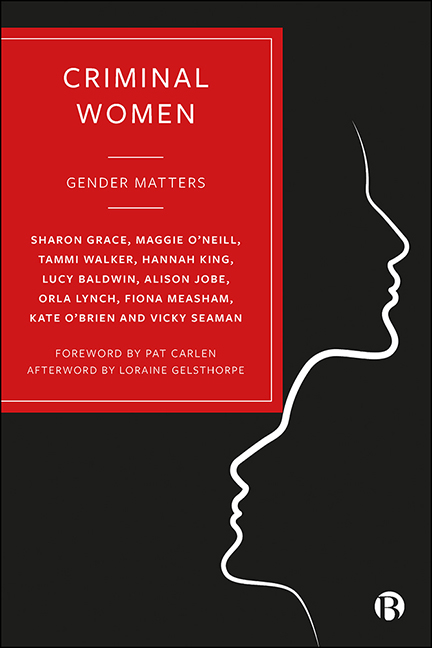Book contents
- Frontmatter
- Contents
- List of Figures and Table
- Notes on the Authors
- Acknowledgements
- Foreword
- Introduction
- 1 Hearing the Voices of Women Involved in Drugs and Crime
- 2 Knifing Off? The Inadequacies of Desistance Frameworks for Women in the Criminal Justice System in Ireland
- 3 Sex Work, Criminalisation and Stigma: Towards a Feminist Criminological Imagination
- 4 Criminal Women in Prison Who Self-harm: What Can We Learn from Their Experiences?
- 5 Criminal Mothers: The Persisting Pains of Maternal Imprisonment
- 6 ‘The World Split Open’: Writing, Teaching and Learning with Women in Prison
- 7 Women’s Biographies through Prison
- Afterword
- Index
2 - Knifing Off? The Inadequacies of Desistance Frameworks for Women in the Criminal Justice System in Ireland
Published online by Cambridge University Press: 15 September 2022
- Frontmatter
- Contents
- List of Figures and Table
- Notes on the Authors
- Acknowledgements
- Foreword
- Introduction
- 1 Hearing the Voices of Women Involved in Drugs and Crime
- 2 Knifing Off? The Inadequacies of Desistance Frameworks for Women in the Criminal Justice System in Ireland
- 3 Sex Work, Criminalisation and Stigma: Towards a Feminist Criminological Imagination
- 4 Criminal Women in Prison Who Self-harm: What Can We Learn from Their Experiences?
- 5 Criminal Mothers: The Persisting Pains of Maternal Imprisonment
- 6 ‘The World Split Open’: Writing, Teaching and Learning with Women in Prison
- 7 Women’s Biographies through Prison
- Afterword
- Index
Summary
Research on crime and offending has traditionally drawn on men's experiences when theorising on causes, motivations and outcomes for individuals who engage in criminal behaviour. Women have rarely featured in this space, and when they do, oftentimes they are essentialised and deterministic frameworks dominate. In spite of the absence of women's voices from this research area, there is an underlying assumption that theories on crime and offending are gender neutral, in that the theories that exists are assumed to have relevance for both men and women. Recent research in this area challenges these assumptions and shows that women's pathways into crime and motivations for offending differ from those of men (Daly, 1992; Chesney-Lind, 1997; Salisbury and Van Voorhis, 2009). In addition, this research shows that women's experiences of desistance are also not easily mapped onto existing theoretical frameworks.
For example, recent reports have documented that women who encounter the Irish criminal justice system (CJS) have complex traumatic developmental histories compounded in adulthood by mental health problems, addiction, domestic violence, homelessness and challenging family and interpersonal relationships (IPRT, 2013; McHugh, 2013). This mirrors the findings of the Corston report (Corston, 2007) that focused exclusively on women in prison in the UK and found significant divergence in the experience of men and women, primarily in relation to interpersonal relationships, social expectations and gender norms:
First, domestic circumstances and problems such as domestic violence, child-care issues, being a single-parent; second, personal circumstances such as mental illness, low self-esteem, eating disorders, substance misuse; and third, socio-economic factors such as poverty, isolation and unemployment. When women are experiencing a combination of factors from each of these three types of vulnerabilities, it is likely to lead to a crisis point that ultimately results in prison. (Corston, 2007: 2)
While Corston (2007) attests to the complexity that is inherent in the experiences of women who come into contact with criminal justice systems, the notion of vulnerability mentioned is somewhat problematic, and it is important that it is not intertwined with causality or individual attribution; ultimately, the issue of agency cannot be ignored. While we know that a range of issues are often prominent in the lives of women within any CJS, rather than focusing on causality, the concept of equifinality is more useful: a recognition that there are multiple pathways into and out of offending for women.
- Type
- Chapter
- Information
- Criminal WomenGender Matters, pp. 37 - 62Publisher: Bristol University PressPrint publication year: 2022
- 1
- Cited by



